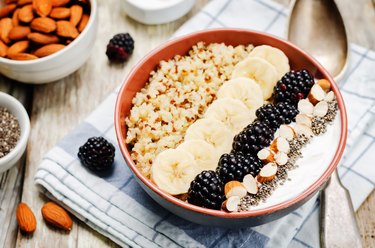
If you hear your stomach growling only an hour after you sat down to breakfast, your yogurt bowl was probably missing some key components. A balance of fiber, protein and healthy fat can help keep you satiated until lunch, so try these three tips to a better bowl and keep the hunger pangs away.
Video of the Day
Video of the Day
1. Load Up On High-Fiber Toppings
This nutrient may help reduce the risk of heart disease, promotes digestive regularity and can promote satiety. Yep, it's fiber. Fiber is a type of carbohydrate found in vegetables and whole grains, according to the FDA, and its gel-like texture takes your body longer to digest, keeping you full for longer.
Ideally, you'll want to get around 25 grams of fiber per day and adding some high-fiber toppings to your breakfast yogurt is a great way to stay full all morning. Fruits including raspberries (8 grams of fiber per cup), pears (5.5 grams per pear) and apples (4.4 grams per apple) are low in calories yet loaded with fiber.
Sprinkling some whole grains onto your yogurt is another way to add fiber to your breakfast. Whole-grain granola or oats are a good go-to but you can even get creative by adding some buckwheat or quinoa to your bowl.
2. Choose High-Protein Yogurt
Protein is another powerhouse nutrient that's key for staying satiated until lunchtime. Increasing your protein intake will also give you more energy and may have positive effects on your body composition, according to an August 2012 study published in the British Journal of Nutrition. In other words, it might just help you lose weight.
But when it comes to protein content, not all yogurt is created equal. You'll want to opt for Greek yogurt, as it's usually much higher in total protein than traditional yogurt, according to the International Food Information Council Foundation. Yogurt also contains probiotics, which feed the friendly bacteria in your gut and keeps your digestive system healthy.
3. Don't Forget Your Fats
Healthy fat is another macronutrient you shouldn't neglect from your breakfast if satiety is the goal, Bonnie Taub-Dix, RD tells us. You'll want to prioritize healthy, unsaturated fat, as it can help improve cholesterol levels, ease inflammation and stabilize heart rhythms, according to the Harvard T.H. Chan School of Public Health.
Choosing low-fat over non-fat yogurt can not only help with satiety but boost your body's vitamin absorption, too. Vitamins A, D, E and K are known as fat-soluble nutrients, meaning they need fat in order to dissolve and be absorbed by the body, according to the National Cancer Institute. So, going with a reduced-fat over a non-fat Greek yogurt can give you some more nutritional bang for your buck.
Taub-Dix also likes to top her yogurt with some raw nuts to boost fat content. Almonds, hazelnuts and pecans are a few excellent options to consider. Seeds can also contribute some healthy unsaturated fat, so don't hesitate to sprinkle some sunflower, chia or hemp seeds, too.
Start Your Day With These Healthy Yogurt Recipes
Ready to put the three tips above to good use? All of our healthy yogurt recipes below contain a good balance of protein, fats and fiber to keep you satiated well into the afternoon.
Read more: 5 Probiotic-Rich Recipes Your Gut Will Love
1. Peach-Chia Yogurt
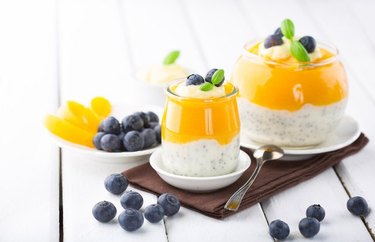
This recipe is sure to keep you full until lunchtime with 267 calories with 5 grams of fat, 9 grams of protein and 8 grams of fiber or about 32 percent of your daily value (DV). However, this recipe needs to sit overnight for at least 12 hours, so make sure to prepare accordingly.
Chia seeds are a packed with fiber, unsaturated fat and protein, according to the USDA. But they'll also provide more than 20 percent of your daily recommended value of magnesium per ounce. Magnesium is a mineral that helps your body process protein and promotes healthy muscle and nerve function, according to the National Institutes of Health (NIH).
Get the Peach-Chia Yogurt recipe and nutrition info here.
2. Flaxseed and Yogurt Breakfast
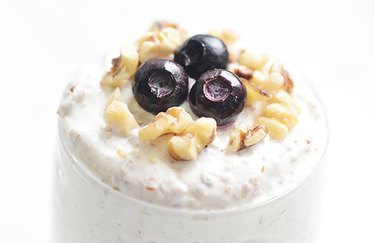
If your mornings are usually hectic with little time to devote to breakfast, this yogurt breakfast is for you. It requires only five minutes of prep time and will provide you with 306 calories, 18 grams of fat, 24 grams of protein and 3 grams of fiber (12 percent of your DV)
Like its chia counterpart, flaxseeds are a great source of magnesium, according to the USDA. Flaxseeds are also a good source of zinc, providing about 11 percent of your daily recommended value. Zinc is an essential mineral in the body responsible for keeping your immune system healthy, per the NIH.
Get the Flaxseed and Yogurt Breakfast recipe and nutrition info here.
3. Grilled Vegetable Greek Yogurt
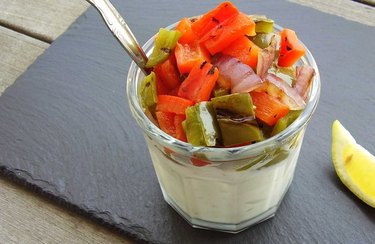
Yes, savory yogurt may be a little unusual. But once you spoon into this recipe, we wager you'll change your mind. And as a bonus, it takes only five minutes to whip up. This veggie-topped bowl is about 315 calories, 25 grams of protein, 15 grams of fat and an impressive 10 grams of fiber, which comes to about 40 percent of your DV.
While you can mix and match any grilled veggies of your preference, this recipe adds asparagus into the mix, which is a great source of vitamin K, providing about 46 percent of your daily value, per the USDA. This vitamin can help keep blood flow healthy and promotes good bone health, according to the NIH.
Get the Grilled Vegetable Greek Yogurt recipe and nutrition info here.
4. Date and Coconut Yogurt With Pistachios
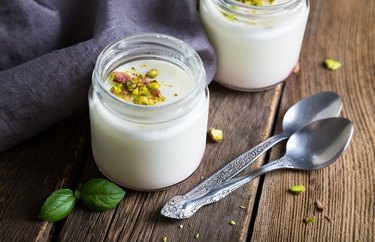
This recipe mixes Greek yogurt with coconut milk to create a unique and decadent flavor for your breakfast. At a total of 403 calories with 25 grams of protein, 11 grams of fat and 3 grams of fiber, this dish is full of all the right nutrients.
With a quarter cup of unsweetened coconut milk, this recipe is a great source of lauric acid. This fatty acid can help boost immune function and may even have some antimicrobial and antibacterial properties, according to a January 2018 study published in Frontiers in Microbiology.
Get the Date and Coconut Yogurt With Pistachios recipe and nutrition info here.
5. Nutty Berry Quinoa Parfait
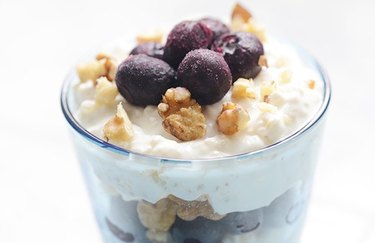
Adding quinoa to yogurt isn't the most common of combinations but it's a great way to incorporate some whole grains into your breakfast. This recipe packs about 352 calories with 16 grams of protein, 19 grams of fat and 6 grams (or 24 percent of your DV) of fiber.
Quinoa is a great source of protein and fiber but will also give your breakfast a boost of iron. One cup of quinoa will supply you with about 15 percent of your daily recommended value of iron, according to the USDA. Iron is a key component of healthy blood cells, muscle growth and hormonal function, according to the NIH.
Get the Nutty Berry Quinoa Parfait recipe and nutrition info here.
- NIH: "Iron"
- USDA: "Quinoa, Cooked"
- Frontiers in Microbiology: "Lauric Acid Is an Inhibitor of Clostridium difficile Growth in Vitro and Reduces Inflammation in a Mouse Infection Model"
- NIH: "Vitamin K"
- USDA: "Asparagus"
- NIH: "Zinc"
- USDA: "Flax Seeds"
- NIH: "Magnesium"
- USDA: "Chia Seeds"
- USDA: "Raspberries"
- USDA: "Pears"
- USDA: "Apple"
- National Cancer Institute: "Fat-Soluble Vitamins"